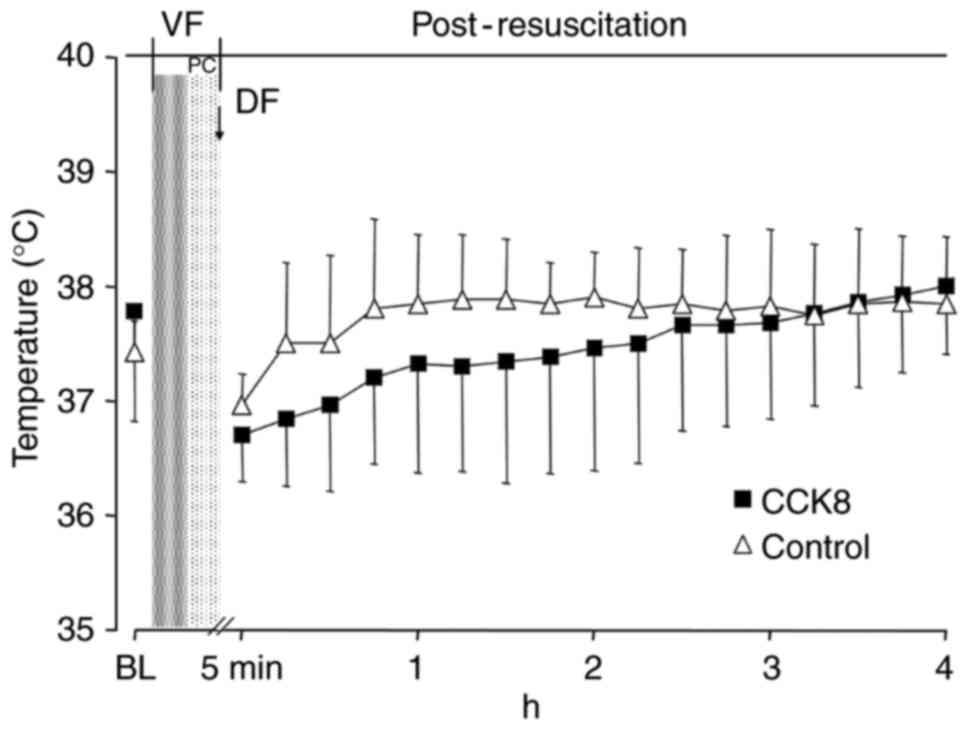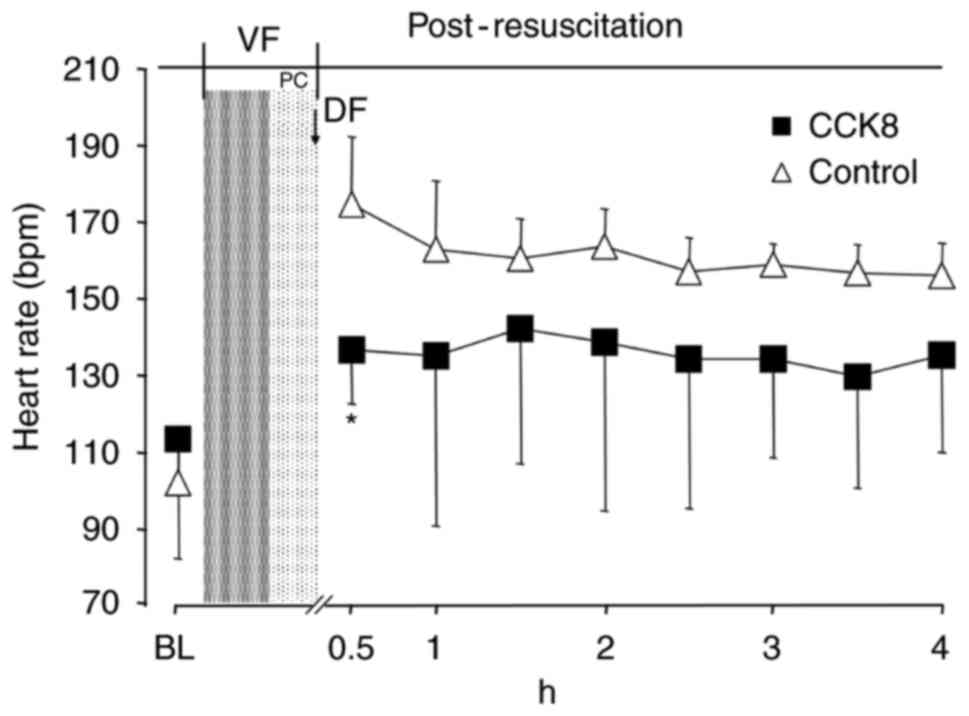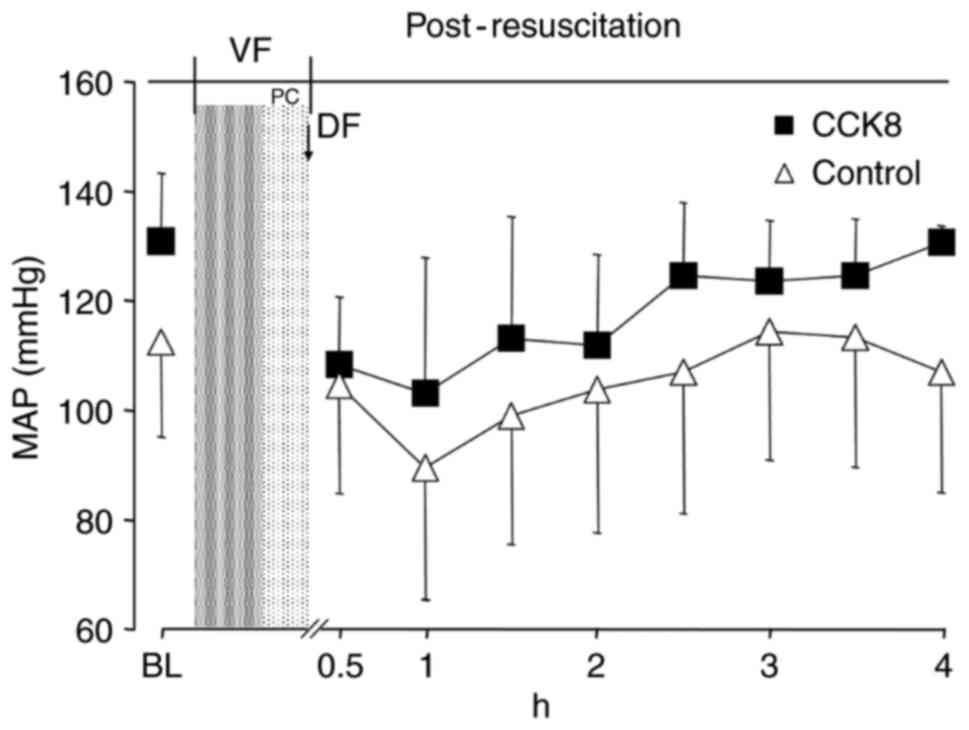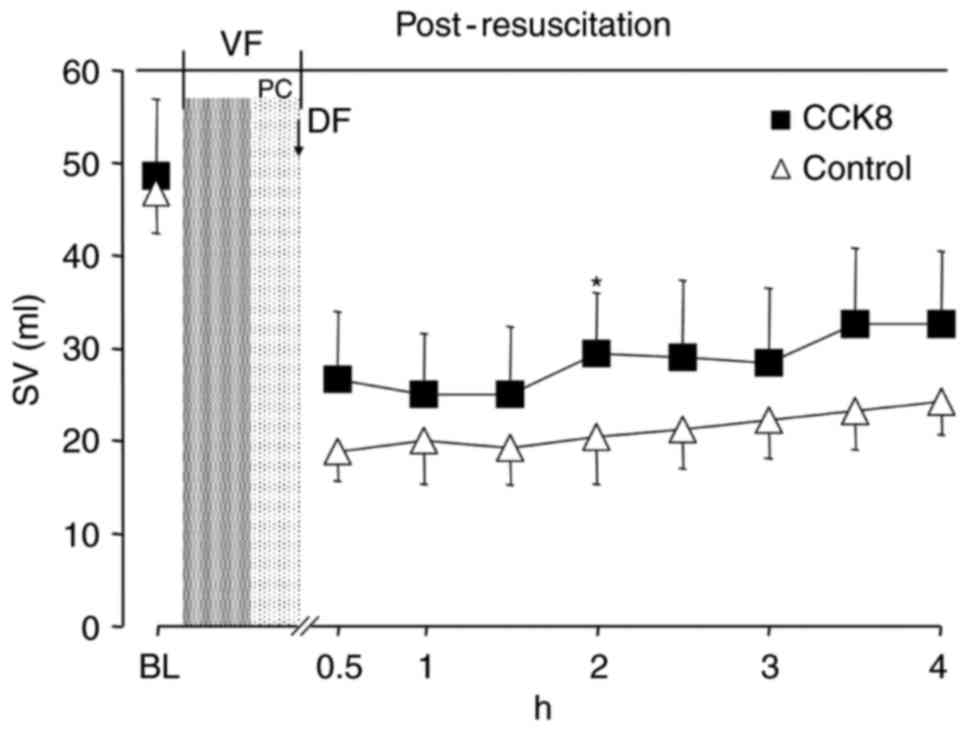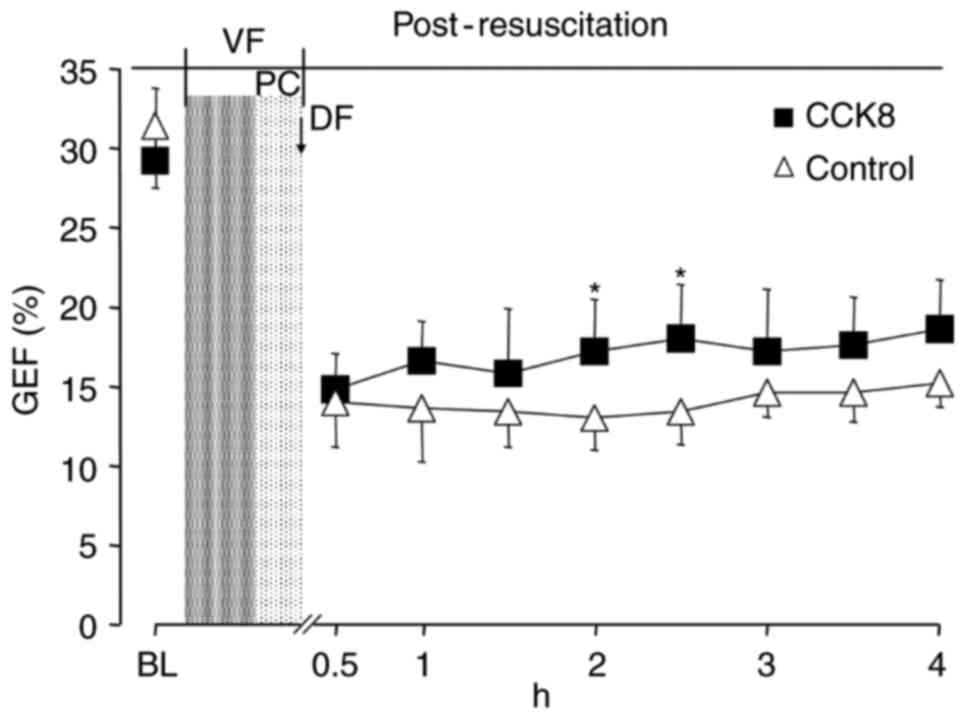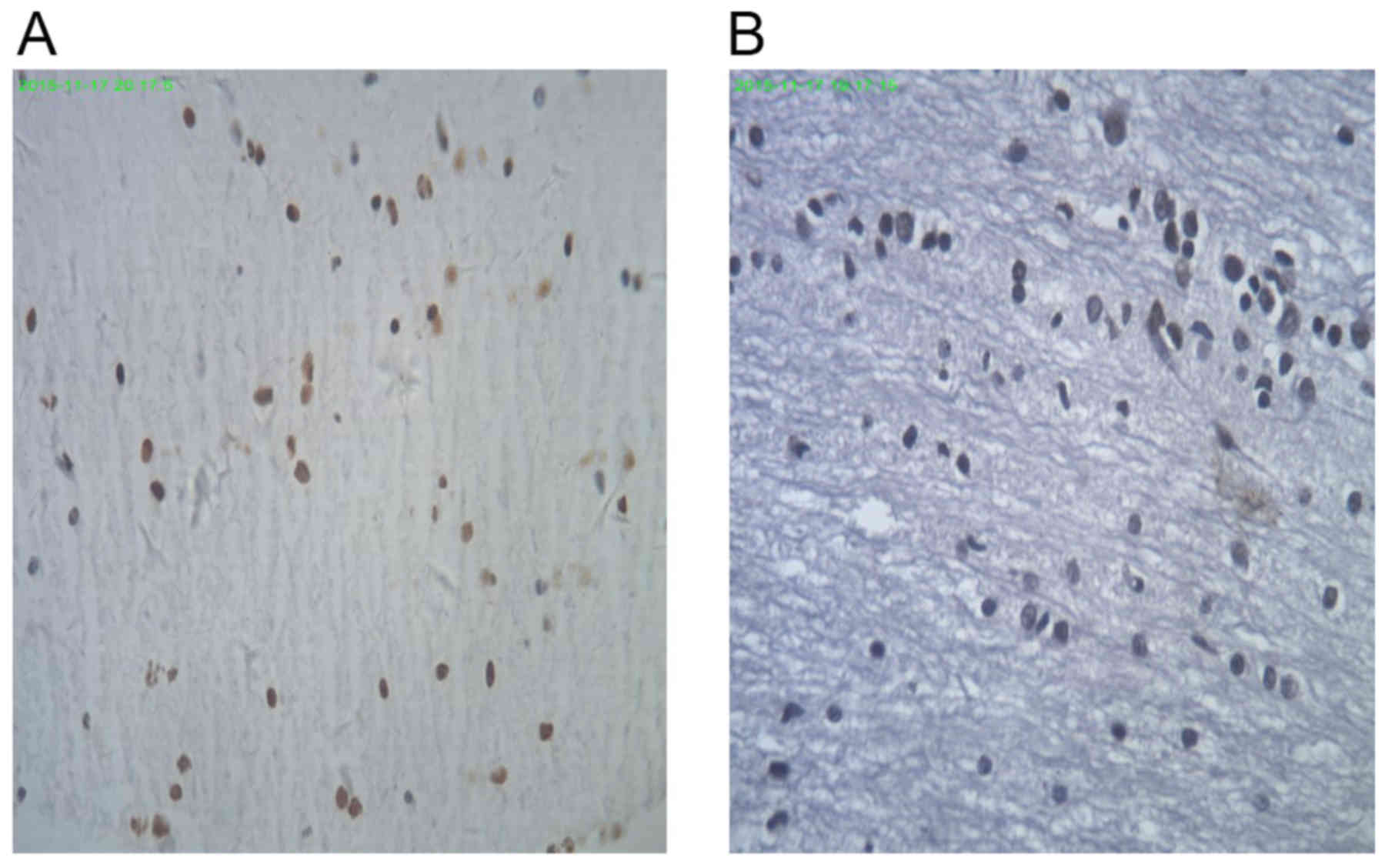|
1
|
Mozaffarian D, Benjamin EJ, Go AS, Arnett
DK, Blaha MJ, Cushman M, de Ferranti S, Després JP, Fullerton HJ,
Howard VJ, et al: Heart disease and stroke statistics-2015 update:
A report from the American Heart Association. Circulation.
131:e29–e322. 2015. View Article : Google Scholar : PubMed/NCBI
|
|
2
|
Atwood C, Eisenberg MS, Herlitz J and Rea
TD: Incidence of EMS-treated out-of-hospital cardiac arrest in
Europe. Resuscitation. 67:75–80. 2005. View Article : Google Scholar : PubMed/NCBI
|
|
3
|
Hua W, Zhang LF, Wu YF, Liu XQ, Guo DS,
Zhou HL, Gou ZP, Zhao LC, Niu HX, Chen KP, et al: Incidence of
sudden cardiac death in China: Analysis of 4 regional populations.
J Am Coll Cardiol. 54:1110–1118. 2009. View Article : Google Scholar : PubMed/NCBI
|
|
4
|
Laver S, Farrow C, Turner D and Nolan J:
Mode of death after admission to an intensive care unit following
cardiac arrest. Intensive Care Med. 30:2126–2128. 2004. View Article : Google Scholar : PubMed/NCBI
|
|
5
|
Neumar RW, Shuster M, Callaway CW, Gent
LM, Atkins DL, Bhanji F, Brooks SC, de Caen AR, Donnino MW, Ferrer
JM, et al: Part 1: executive summary: 2015 American Heart
Association Guidelines Update for Cardiopulmonary Resuscitation and
Emergency Cardiovascular Care. Circulation. 132(18 Suppl 2):
S315–S367. 2015. View Article : Google Scholar : PubMed/NCBI
|
|
6
|
Nielsen N, Wetterslev J, Cronberg T,
Erlinge D, Gasche Y, Hassager C, Horn J, Hovdenes J, Kjaergaard J,
Kuiper M, et al: Targeted temperature management at 33°C versus
36°C after cardiac arrest. N Engl J Med. 369:2197–2206. 2013.
View Article : Google Scholar : PubMed/NCBI
|
|
7
|
Sun S, Tang W, Song F, Chung SP, Weng Y,
Yu T and Weil MH: Pharmacologically induced hypothermia with
cannabinoid receptor agonist WIN55, 212-2 after cardiopulmonary
resuscitation. Crit Care Med. 38:2282–2286. 2010. View Article : Google Scholar : PubMed/NCBI
|
|
8
|
Chung SP, Song FQ, Yu T, Weng Y, Sun S,
Weil MH and Tang W: Effect of therapeutic hypothermia vs δ-opioid
receptor agonist on post resuscitation myocardial function in a rat
model of CPR. Resuscitation. 82:350–354. 2011. View Article : Google Scholar : PubMed/NCBI
|
|
9
|
Weng Y, Sun S, Song F, Phil Chung S, Park
J, Harry Weil M and Tang W: Cholecystokinin octapeptide induces
hypothermia and improves outcomes in a rat model of cardiopulmonary
resuscitation. Crit Care Med. 39:2407–2412. 2011. View Article : Google Scholar : PubMed/NCBI
|
|
10
|
Zetler G: Cholecystokinin octapeptide,
caerulein and caerulein analogues: Effects on thermoregulation in
the mouse. Neuropharmacology. 21:795–801. 1982. View Article : Google Scholar : PubMed/NCBI
|
|
11
|
Katsuura G and Itoh S: Effect of
cholecystokinin octapeptide on body temperature in the rat. Jpn J
Physiol. 31:849–858. 1981. View Article : Google Scholar : PubMed/NCBI
|
|
12
|
Tirassa P and Costa N: CCK-8 induces NGF
and BDNF synthesis and modulates TrkA and TrkB expression in the
rat hippocampus and septum: Effects on kindling development.
Neurochem Int. 50:130–138. 2007. View Article : Google Scholar : PubMed/NCBI
|
|
13
|
Zhang JG, Liu JX, Jia XX, Geng J, Yu F and
Cong B: Cholecystokinin octapeptide regulates the differentiation
and effector cytokine production of CD4(+) T cells in vitro. Int
Immunopharmacol. 20:307–315. 2014. View Article : Google Scholar : PubMed/NCBI
|
|
14
|
Ling YL, Huang SS, Wang LF, Zhang JL, Wan
M and Hao RL: [Cholecystokinin-octapeptide (CCK-8) reverses
experimental endotoxin shock. Sheng Li Xue Bao. 48:390–394.
1996.(In Chinese). PubMed/NCBI
|
|
15
|
Institute for Laboratory Animal Research,
. Guide for the Care and Use of Laboratory Animals. 8th. National
Research Council; Washington, DC: pp. 1072–1073S. 1996
|
|
16
|
Xu J, Hu X, Yang Z, Wu X, Bisera J, Sun S
and Tang W: Miniaturized mechanical chest compressor improves
calculated cerebral perfusion pressure without compromising
intracranial pressure during cardiopulmonary resuscitation in a
porcine model of cardiac arrest. Resuscitation. 85:683–688. 2014.
View Article : Google Scholar : PubMed/NCBI
|
|
17
|
Yang Z, Tang D, Wu X, Hu X, Xu J, Qian J,
Yang M and Tang W: A tourniquet assisted cardiopulmonary
resuscitation augments myocardial perfusion in a porcine model of
cardiac arrest. Resuscitation. 86:49–53. 2015. View Article : Google Scholar : PubMed/NCBI
|
|
18
|
Gong P, Li CS, Hua R, Zhao H, Tang ZR, Mei
X, Zhang MY and Cui J: Mild hypothermia attenuates mitochondrial
oxidative stress by protecting respiratory enzymes and upregulating
MnSOD in a pig model of cardiac arrest. PLoS One. 7:e353132012.
View Article : Google Scholar : PubMed/NCBI
|
|
19
|
Kapás L, Benedek G and Penke B:
Cholecystokinin interferes with the thermoregulatory effect of
exogenous and endogenous opioids. Neuropeptides. 14:85–92. 1989.
View Article : Google Scholar : PubMed/NCBI
|
|
20
|
Yannopoulos D, Zviman M, Castro V,
Kolandaivelu A, Ranjan R, Wilson RF and Halperin HR:
Intra-cardiopulmonary resuscitation hypothermia with and without
volume loading in an ischemic model of cardiac arrest. Circulation.
120:1426–1435. 2009. View Article : Google Scholar : PubMed/NCBI
|
|
21
|
Ye S, Weng Y, Sun S, Chen W, Wu X, Li Z,
Weil MH and Tang W: Comparison of the durations of mild therapeutic
hypothermia on outcome after cardiopulmonary resuscitation in the
rat. Circulation. 125:123–129. 2012. View Article : Google Scholar : PubMed/NCBI
|
|
22
|
Farkas M and Komáromi I: Central effects
of chemical transmitters on temperature regulation in the adult rat
and the newborn guinea pig. Int J Biometeorol. 15:316–320. 1971.
View Article : Google Scholar : PubMed/NCBI
|
|
23
|
Adrie C, Adib-Conquy M, Laurent I, Monchi
M, Vinsonneau C, Fitting C, Fraisse F, Dinh-Xuan AT, Carli P,
Spaulding C, et al: Successful cardiopulmonary resuscitation after
cardiac arrest as a ‘sepsis-like’ syndrome. Circulation.
106:562–568. 2002. View Article : Google Scholar : PubMed/NCBI
|
|
24
|
Geppert A, Zorn G, Karth GD, Haumer M,
Gwechenberger M, Koller-Strametz J, Heinz G, Huber K and
Siostrzonek P: Soluble selectins and the systemic inflammatory
response syndrome after successful cardiopulmonary resuscitation.
Crit Care Med. 28:2360–2365. 2000. View Article : Google Scholar : PubMed/NCBI
|
|
25
|
Miyamoto S, Shikata K, Miyasaka K, Okada
S, Sasaki M, Kodera R, Hirota D, Kajitani N, Takatsuka T, Kataoka
HU, et al: Cholecystokinin plays a novel protective role in
diabetic kidney through anti-inflammatory actions on macrophage:
Anti-inflammatory effect of cholecystokinin. Diabetes. 61:897–907.
2012. View Article : Google Scholar : PubMed/NCBI
|
|
26
|
Luyer MD, Greve JW, Hadfoune M, Jacobs JA,
Dejong CH and Buurman WA: Nutritional stimulation of
cholecystokinin receptors inhibits inflammation via the vagus
nerve. J Exp Med. 202:1023–1029. 2005. View Article : Google Scholar : PubMed/NCBI
|
|
27
|
McDermott JR, Leslie FC, D'Amato M,
Thompson DG, Grencis RK and McLaughlin JT: Immune control of food
intake: Enteroendocrine cells are regulated by CD4+ T lymphocytes
during small intestinal inflammation. Gut. 55:492–497. 2006.
View Article : Google Scholar : PubMed/NCBI
|
|
28
|
Li S, Ni Z, Cong B, Gao W, Xu S, Wang C,
Yao Y, Ma C and Ling Y: CCK-8 inhibits LPS-induced IL-1beta
production in pulmonary interstitial macrophages by modulating PKA,
p38, and NF-kappaB pathway. Shock. 27:678–686. 2007. View Article : Google Scholar : PubMed/NCBI
|
|
29
|
Zhang JG, Cong B, Li QX, Chen HY, Qin J
and Fu LH: Cholecystokinin octapeptide regulates
lipopolysaccharide-activated B cells co-stimulatory molecule
expression and cytokines production in vitro. Immunopharmacol
Immunotoxicol. 33:157–163. 2011. View Article : Google Scholar : PubMed/NCBI
|
|
30
|
Zhang JG, Cong B, Jia XX, Li H, Li QX, Ma
CL and Feng Y: Cholecystokinin octapeptide inhibits immunoglobulin
G1 production of lipopolysaccharide-activated B cells. Int
Immunopharmacol. 11:1685–1690. 2011. View Article : Google Scholar : PubMed/NCBI
|
|
31
|
Center for Drug Evaluation and Research
(CDER), . Estimating the Maximum Safe. Starting Dose in Initial
Clinical Trials for Therapeutics in Adult Healthy. Volunteers. U.S.
Department of Health and Human Services. Food and Drug
Administration; Rockville, MD: pp. 6–7S. 2005
|















